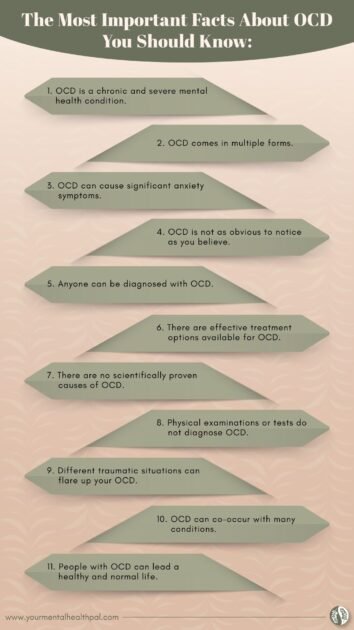“I need to go organize my work calendar for this week. I’m so OCD, you know.”
“I am so obsessed with organizing my shirts using colors; it’s my OCD acting out.”
“She’s so OCD that she’ll keep cleaning the house daily.”
Obsessive-compulsive disorder, or OCD, is a widely and commonly misunderstood and stereotyped mental health condition. It has been regarded as a personality quirk (one that’s portrayed to be extremely likable and cute). Sitcom characters like Monica Geller from Friends are loved worldwide for their supposed OCD tendencies, and the Monk can solve crime mysteries using them.
These depictions are far from the actual facts about OCD and do not show the complete picture of what having the anxiety disorder feels like. Trivializing having OCD as a mere personality quirk or glorifying it as a superpower are problematic parts of mainstream culture.
OCD is NOT just your favorite character’s idiosyncrasy or a name for someone’s distaste for clutter. It’s a serious and often debilitating mental health disorder that causes intrusive thoughts and compulsions that can disrupt every aspect of an individual’s life. It’s caused by a mixture of genetic and environmental factors.
In this post, we will dive deeper into the most important and interesting facts about OCD that’ll help shed much-needed light on the often misunderstood condition. Let’s dive in.

Important Facts About People With OCD

1. OCD is a chronic and severe mental health condition.
One of the first and most important facts about OCD is that it’s real and diagnosable. Contrary to popular belief, it’s not just a tendency or habit that people can control.
As per the Diagnostic and Statistical Manual of Mental Disorders (DSM-V), obsessive-compulsive disorder is a type of anxiety disorder that leads to intrusive thoughts (obsessions) that cause repetitive behaviors (compulsions). It is caused by a combination of various hereditary and environmental factors.
2. OCD comes in multiple forms.
One of the most common myths about OCD is that it’s related to germs, being organized, uptight, or meticulous. However, while these can be signs of a particular type of OCD, it’s essential to understand that OCD occurs on a vast spectrum. There are multiple different types of OCD depending on the symptoms individuals show.
These include the following:
- Checking: This form of OCD is characterized by a persistent need to double-check almost everything from door knobs, gas stoves, locks, etc.
- Contamination: It is marked by an extreme fear of germs or dirt. Individuals also show repetitive and obsessive behaviors like disinfecting and cleaning.
- Rumination: It causes intrusive thoughts that might be violent, religious, or sexual.
3. OCD can cause significant anxiety symptoms.
Another important fact about OCD is that the condition is characterized by anxiety disorders in the DSM-V. Therefore, people with OCD might deal with frequent and severe bouts of anxiousness. Compulsive thoughts and repetitive behaviors are thought to be ways to manage this anxiety. However, the more people engage with them, the harder it gets to control the stress.
4. OCD is not as obvious to notice as you believe.
Here’s one of the facts about people with OCD that might make you question everything you have learned about the condition through the Internet – OCD is not obvious. People with OCD are thought to have pretty open and obvious compulsions like washing hands, checking locks, and whatnot.
But this discourse misses a crucial aspect about compulsions. Compulsions do not just involve repetitive behaviors. Thoughts can act as compulsive behaviors, too. Therefore, there’s a whole range of individuals whose compulsions are purely in their heads and invisible to the common eye.
For instance, people might believe they are in danger and have to mentally repeat a specific phrase to protect themselves. So, while this person is dealing with this compulsion, another individual right next to them might be completely oblivious to the situation.
These myths about OCD are prevalent because the condition is generally associated with outward behaviors. However, one of the most important facts about obsessive-compulsive disorder is that it’s defined by the inherent fear that it causes and not the reaction associated with it.
5. Anyone can be diagnosed with OCD.
As per the National Institute of Mental Health (NIMH), around 2.3% of people have at least one OCD episode in their lives.
Another interesting fact about OCD is that, unlike other mental health conditions, it occurs with equal frequency across ethnicities and genders. However, certain factors make you more susceptible to the condition. These include the following:
- Age: As per the American Academy of Child and Adolescent Psychiatry, OCD most commonly develops during the late adolescent years, and the risk gradually decreases as you age.
- Gender: As per the established facts about OCD, it occurs equally in men and women after puberty. But it’s more common in men during childhood.
- Genetics: Another crucial and important fact about OCD is that the first-degree family members of patients with OCD are five times more likely to develop the condition.
6. There are effective treatment options available for OCD.
Effective treatment options for OCD are available that can help individuals deal with the condition. It’s a fact about OCD that there’s unfortunately no cure for the condition. However, the treatment options are generally aimed at improving the day-to-day management of symptoms.
Medications along with psychotherapies like cognitive-behavioral therapy (CBT) are effective.
Treatments like deep brain stimulation for those whose symptoms are treatment-resistant are being extensively researched.
7. There are no scientifically proven causes of OCD.
One of the most important facts about OCD is that the condition has no known specific causes. However, recent developments have outlined a list of probable causes, including the following:
- genetics,
- traumatic life events,
- environmental factors, and
- differences in brain chemistry or neurology.
While it has been found that OCD is hereditary, scientists have not been able to attribute the occurrence of the disorder to any gene. In the case of environmental factors, which conditions can increase or decrease the chances of developing the disorder haven’t been outlined. When it comes to the brains of those with OCD, there have been theories about a lack of communication between different areas of the brain.
8. Physical examinations or tests do not diagnose OCD.
When most people think of diagnosis, they picture brain imaging, blood tests, and other examinations along those lines.
But here’s an interesting fact about OCD and most mental health disorders – they aren’t diagnosed by scans or blood tests. For starters, a doctor might conduct physical examinations to rule out the chances of any other conditions.
To diagnose OCD, a mental health professional will ask you a set of questions and look for three signs of the condition (as mentioned in DSM-V):
- obsessions,
- compulsions, and
- whether these symptoms obstruct your regular life.
9. Different traumatic situations can flare up your OCD.
Research published by Psychiatry Research highlighted several facts about people with OCD. The most crucial findings of the research associated with the occurrence of OCD (especially in women) with traumatic life events, namely:
- hospitalization of a family member,
- major personal physical illness, and
- loss of a personally valuable object.
However, less severe situations can also trigger OCD.
10. OCD can co-occur with many conditions.
Another fact about OCD that highlights how severe the condition is is that it shares a close relationship with a variety of other mental health conditions. Therefore, people with OCD can also have depression, anxiety, and body dysmorphic disorder. As per NIMH, around one-third of those with OCD have at least one depressive episode.
11. People with OCD can lead a healthy and normal life.
OCD is a severe and chronic condition. However, one of the most hopeful facts about OCD is that with the right help and treatment, affected individuals can lead healthy and productive lives. Therefore, it’s crucial to get the required help as soon as possible.
Conclusion:
Obsessive-compulsive disorder is one of the most stereotyped and misunderstood mental health conditions. It has been either glorified or shunned in mainstream conversations, so much so that every discourse about it is flooded with unhealthy and deeply disturbing narratives.
This is why learning and understanding facts about OCD is important. It helps you cut through the cloud of misinformation. It empowers you to help yourself and those around you.
Not just beliefs; we need to change how we talk about OCD in the mainstream. Here’s a complete guide on what not to say to someone with OCD that’ll help you get started.
To continue learning about mental health daily, subscribe to Your Mental Health Pal.

